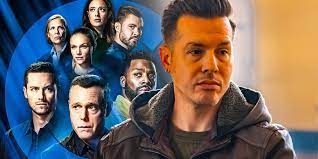
The relentless hum of the camera, the glare of the studio lights, the rapid-fire dialogue of a high-stakes police procedural – this is the visible symphony of Chicago PD. For over a decade, viewers have been drawn into the gritty, street-level world of District 21, captivated by the intricate dance between justice and the harsh realities of urban crime. But like any complex performance, the magic often lies not just in what we see on screen, but in the unseen currents flowing beneath the surface. The allure of "behind-the-scenes drama" is an almost irresistible force, transforming the fictional family into a real-life psychological puzzle, whispered about in the digital ether.
Imagine the set of Chicago PD as a crucible. Day in, day out, for months on end, a diverse group of individuals – actors, directors, crew – are bound together in the intense, often emotionally draining process of creation. They embody characters grappling with trauma, moral ambiguity, and life-or-death situations. This sustained immersion in dark narratives, coupled with the grueling hours and constant pressure to perform, inevitably tests the resilience of even the most amicable personalities. It’s in this pressurized environment that the seeds of discord, whether real or imagined, can be sown. A long take, a missed line, a creative disagreement over a character's motivation – in the microscopic world of a television set, these small friction points can feel amplified, misinterpreted, or simply wear down the polite veneer that professionalism demands.
The actors, in particular, face a unique challenge. They are paid to inhabit characters, to forge convincing on-screen relationships, to project an image of unity and camaraderie that aligns with the narrative. This professional imperative often means that personal feelings, disagreements, or even simple fatigue are meticulously masked. Yet, for the eagle-eyed fan, every subtle shift in body language, every fleeting glance in an interview, every nuanced absence from a social media group photo becomes a clue, a thread in a speculative tapestry. Did the chemistry between two characters seem a little off in that last scene? Was actor A noticeably absent from actor B’s birthday celebration? The smallest data points are magnified, feeding the collective hunger for the tantalizing void of the unspoken.
The digital age, of course, serves as a powerful echo chamber for these whispers. Fan forums dissect every public appearance, social media follows and unfollows become geopolitical events, and the departure of a beloved cast member, like the highly publicized exit of Sophia Bush, can ignite a wildfire of speculation, leaving behind a smoky trail of unanswered questions. While official statements often cite "creative differences" or "pursuing other opportunities," the vacuum left by such departures is quickly filled with theories ranging from creative clashes with showrunners to personal animosity between co-stars. The truth, more often than not, is far more mundane and complex than the dramatic narratives spun by eager fans. It might be simple contract negotiations, a desire for new challenges, or genuine fatigue from the relentless grind of network television. Yet, the human mind, wired for narrative, prefers the intrigue of a fractured relationship.
Ultimately, the allure of "behind-the-scenes drama" in a show like Chicago PD is a testament to our fascination with the human condition, even within the confines of a fictional world. We want to believe that the intensity we see on screen carries over into the personal lives of those who create it. We project our own experiences of workplace dynamics, friendships, and disagreements onto the actors, seeking relatable narratives beyond the scripted ones. While the actual extent of any deep-seated "drama" among the Chicago PD cast remains, as it should, largely private, the perception of it is a powerful force. It adds an extra layer of intrigue, a tantalizing peek behind the curtain, reminding us that even the most cohesive on-screen families are, at their core, a fragile ecosystem of distinct individuals navigating the pressures and paradoxes of fame, creativity, and constant collaboration. And perhaps, that whisper of drama, real or imagined, only serves to underscore the remarkable professionalism required to deliver a show that, year after year, continues to hold us in its thrilling, gritty grasp.
